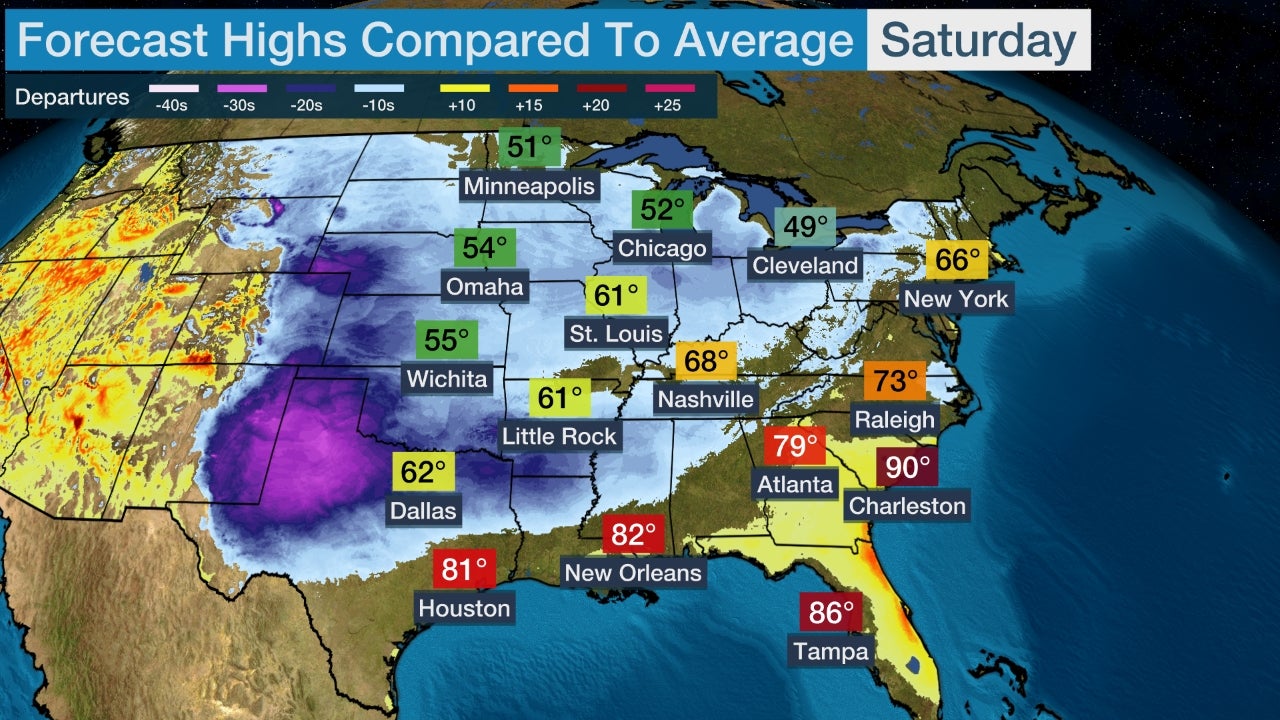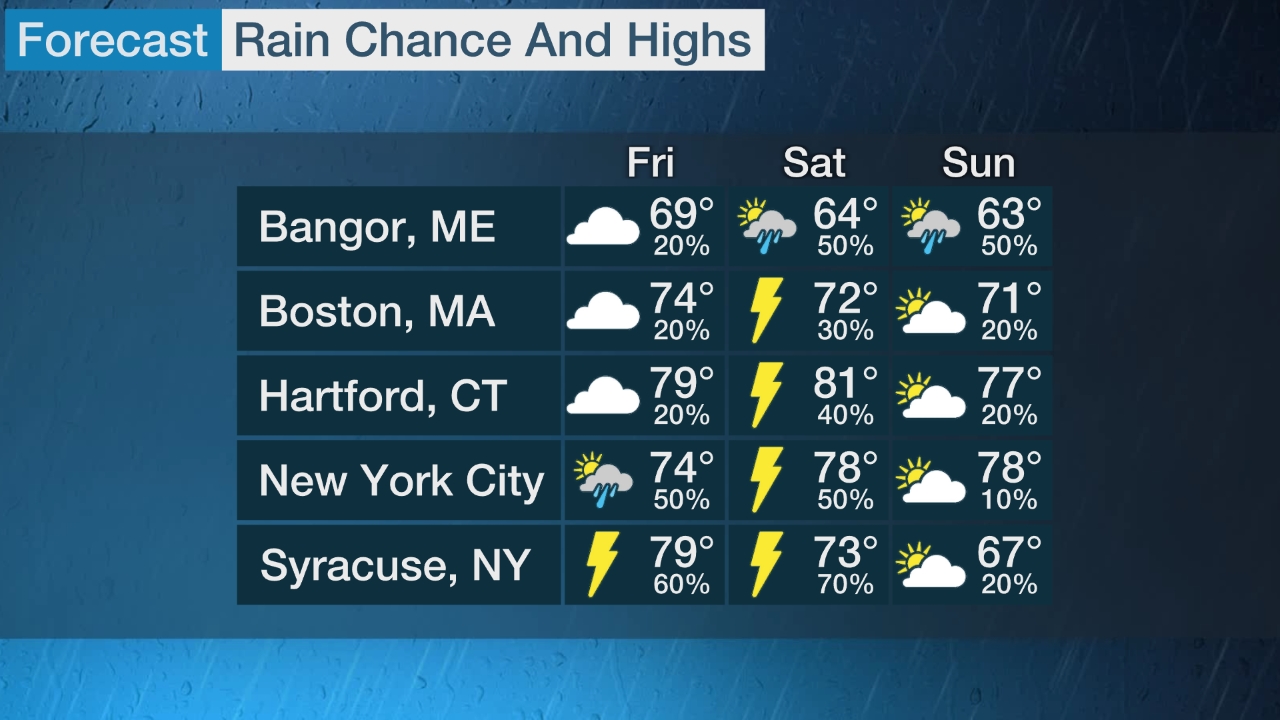After Dumping Snow in the West, The Next Eastern Storm Will Likely Be More Wet Than Wintry
00:44
Next Storm Looking More Wet than Wintry
Meteorologist Domenica Davis looks at the forecast for the next winter weather we can expect in the South.
At a Glance
- A low-pressure system will bring mainly rain to the central and eastern U.S. late this week into the weekend.
- The rain could be heavy in some areas.
- Strong to severe thunderstorms are possible in parts of the South.
- With limited cold air, any wintry weather should be confined to the nation's northern tier.
A new storm system now sweeping into the Pacific Northwest will emerge over the central and eastern United States, where it will likely produce more rain than snow or ice late this week into the weekend.
Rain and mountain snow, heavy at times, are expected in the Northwest Tuesday, with snow then spreading into the Rockies by Wednesday. Several feet of snow are expected in the Washington Cascades, and over a foot of snow may blanket parts of the northern Rockies.
The system will emerge over the Plains and Midwest Thursday before slowly moving toward the East Coast Friday into the weekend.
A low-pressure system will emerge in the central and eastern states late this week, but cold air will be limited.
With limited cold air east of the Rockies the next several days, any snow or ice from this next storm should be very limited and confined to the nation's northern tier, unlike Winter Storm Diego, which produced heavy snow and ice in the South.
Locally heavy rain is likely in portions of the South late this week. There could also be severe thunderstorms in a few parts of the South.
Forecast
Thursday-Thursday Night
- Rain, heavy at times, will spread into parts of the central and southern Plains and Mississippi Valley, then into the Ohio Valley and Southeast overnight.
- A few severe thunderstorms are possible in the Lower Mississippi Valley and northern Gulf Coast, but an outbreak of severe weather is not expected.
- Some light snow or ice is possible in parts of the upper Midwest and northern Great Lakes, especially by Thursday night.
- A few severe thunderstorms are possible in the Lower Mississippi Valley and northern Gulf Coast, but an outbreak of severe weather is not expected.
- Some light snow or ice is possible in parts of the upper Midwest and northern Great Lakes, especially by Thursday night.
Thursday's Forecast
(The green shadings depict where rain and thunderstorms are possible. Areas that are shaded blue could see snow. Purple-shaded locations may see a mix of snow and rain. Areas in pink may see sleet or freezing rain (ice).)
Friday
- Rain, heavy at times, is forecast from the mid-Mississippi Valley to the Southeast, Ohio Valley, Appalachians and mid-Atlantic during the day, spreading into the Northeast at night.
- Thunderstorms are possible in parts of the Southeast, particularly in Florida.
- The precipitation may fall as light snow, sleet or freezing rain in portions of the northern Great Lakes, Adirondacks and northern New England.
- Thunderstorms are possible in parts of the Southeast, particularly in Florida.
- The precipitation may fall as light snow, sleet or freezing rain in portions of the northern Great Lakes, Adirondacks and northern New England.
Friday's Forecast
(The green shadings depict where rain and thunderstorms are possible. Areas that are shaded blue could see snow. Purple-shaded locations may see a mix of snow and rain. Areas in pink may see sleet or freezing rain (ice).)
Saturday
- The details of Saturday's forecast are quite uncertain, given disagreement among the numerical models.
- Rain may persist in much of the East.
- Snow or some ice is possible from parts of upstate New York to northern New England.
- Rain may persist in much of the East.
- Snow or some ice is possible from parts of upstate New York to northern New England.
Saturday's Forecast
(The green shadings depict where rain and thunderstorms are possible. Areas that are shaded blue could see snow. Purple-shaded locations may see a mix of snow and rain. Areas in pink may see sleet or freezing rain (ice).)
Precipitation could linger in the parts of the East Sunday, but, as we said with Saturday, the forecast this weekend remains uncertain. Despite the uncertainty, this doesn't appear to be a major storm with significant impact on travel this weekend.
How Much Rain and Snow?
Many areas from the lower Mississippi Valley to the Ohio Valley, mid-Atlantic and Southeast may pick up an inch or more of rain from this next storm system late in the week into this weekend.
This rain falling on leftover snowpack may trigger flash flooding Friday in the Winter Storm Diego affected parts of the Southeast. This may also lead to river flooding in parts of the Carolinas, in particular, by the weekend, possibly lingering for a few days.
Any snow will likely be limited across the northern tier, with light amounts anticipated in most areas.
Rain and Snow Outlook
(While it is too far out in time to specify exact forecast snowfall totals, areas in the purple and pink contours have the highest chance at heavy snowfall.)
Check back to weather.com for forecast updates in the days ahead.
The Weather Company’s primary journalistic mission is to report on breaking weather news, the environment and the importance of science to our lives. This story does not necessarily represent the position of our parent company, IBM.





No comments:
Post a Comment